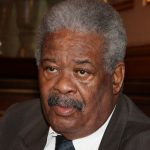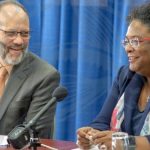High School Students in Trinidad and Tobago engaged on Reparations, Capitalism and Slavery

As part of a symposium on reparations, students from more than 10 high schools in Trinidad and Tobago were invited to the UWI St. Augustine Faculty of Education for a programme of activities dedicated to Dr. Eric Williams’ work.
The symposium focuses on the book Capitalism and Slavery which was written by the former Trinidad and Tobago Prime Minister and CARICOM Founding Father 75 five years ago. It was hosted by the CARICOM Reparations Commission in collaboration with the UWI Centre for Reparation and the Faculty of Humanities and Education UWI, St. Augustine .
The interaction with the students included performances and lectures from well known historians including Director of the Centre for Reparations Research, Professor Verene Shepherd.
A Trinidadian scholar based at the University of Oxford, Dr. Dexnell Peters, examined the Impact of Capitalism and Slavery with the students. He encouraged those who were interested in studying history, especially Caribbean History, to pursue their studies at the University of the West Indies or regionally because it was one of the best places to learn about the Region’s history and be able to review it critically and analytically.
Dean of the Faculty of Humanities and Education at UWI St. Augustine, Professor Heather Cateau, also engaged the students. She gave a review of Dr. Williams’ book Capitalism and Slavery… 75 years later. She told them about the actual book as well as the man “Dr. Eric Williams” former Prime Minister of Trinidad and Tobago and founding father of CARICOM who began his career in the teaching profession.
Professor Shepherd, in her presentation to the students, gave a brief overview of slavery and explained the progress of the current CARICOM reparations movement. She also gave a keynote address the previous evening at the symposium where she outlined parts of the history of slavery and explored some of the accomplishments of the reparations movement. She also informed participants that the CARICOM Reparations Commission was currently in the process of drafting another round of letters to the European countries involved in slavery that would include additional countries that were not included when the first round of letters was sent.
The symposium, which concluded on Thursday, examined Dr. Eric Williams’ Caribbean Vision, the profits from enslavement in the 16th to 19th century, the impact on Capitalism on the World today, Capitalism and Slavery and Reparations, Capitalism and Global Connections as well as Decolonising Caribbean History.
On the first panel discussion on the first day of the symposium, Williams’ daughter, Erica Williams, made a presentation entitled “Eric Eustace Williams: Too Big to be Small”.
Source: CARICOM TODAY

 Previous Post
Previous Post Next Post
Next Post